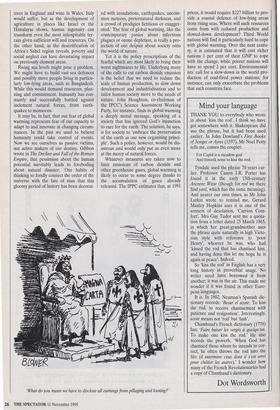Mind your language
THANK YOU to everybody who wrote in about 'kiss the rod'. I think we have got somewhere with it. Shakespeare did use the phrase, but it had been used earlier. In John Dowland's First Booke of Songes or Ayres (1597), Mr Noel Petty tells me, comes the couplet:
For Cupid is a meadow god And forceth none to kiss the rod.
Tyndale used the phrase 70 years ear- lier. Professor Canon J.R. Porter has found it in the early 13th-century Ancrene Wisse (though for rod we there find yard, which has the same meaning). And nearer our own times, as Mr John Larkin wrote to remind me, Gerard Manley Hopkins uses it in one of the sonnets of desolation, 'Carrion Com- fort'. Mrs Gay Tudor sent me a quota- tion from a letter dated 25 March 1865, in which her great-grandmother uses the phrase quite naturally in high Victo- rian style with reference to 'poor Henry', whoever he was, who had `kissed the rod that has chastised him, and having done this let me hope he is again at peace'. Indeed.
So 'kiss the rod' in English has a very long history in proverbial usage. No writer need have borrowed it from another; it was in the air. This made me wonder if it was found in other Euro- pean languages.
It is. In 1802, Neuman's Spanish dic- tionary records: Besar el azote. To kiss the rod, to receive chastisement with patience and resignation'. Interestingly, azote means not 'rod' but 'lash'.
Chambaud's French dictionary (1778) has: 'Faire baiser les verges a quelqu'un. To make one kiss the rod.' He also records the proverb, 'When God has chastised those whom he intends to cor- rect, he often throws the rod into the fire (if extermine ceux dont it s'est servi pour chatier les autres).' I wonder how many of the French Revolutionaries had a copy of Chambaud's dictionary.
Dot Wordsworth


















































































 Previous page
Previous page